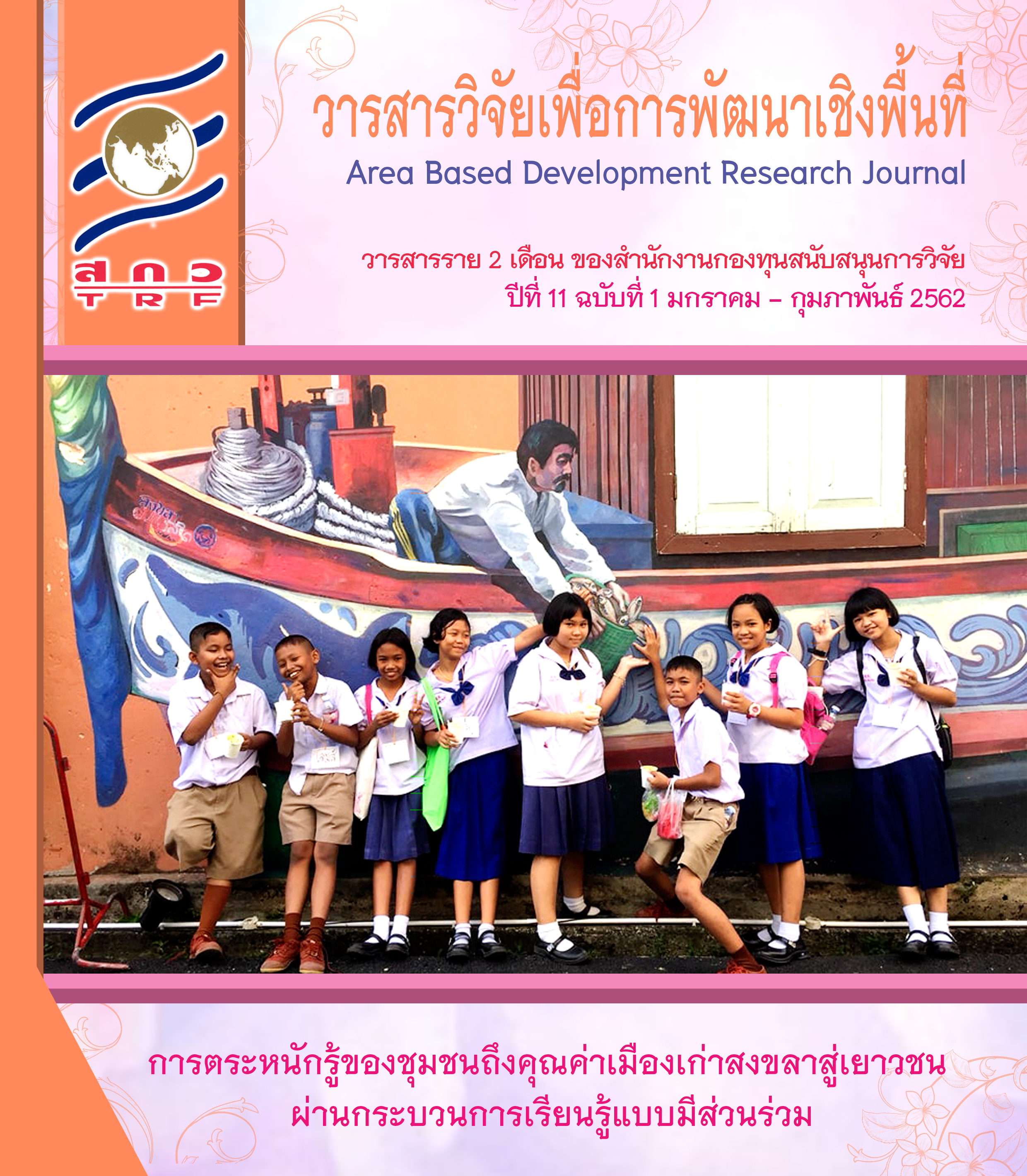Community’s Awareness of Songkhla Old Town Heritage Value among the Youth Through Participatory Learning Process
Main Article Content
Abstract
The objectives of this research are to develop 1) a cooperative learning process among students, youths, local people, and networking to support the awareness of Songkhla old town values towards the world heritage promotion, 2) a framework of local school curriculum to raise awareness on the value in Songkhla old town among students from Pratomsuksa 1 to Pratomsuksa 6, and 3) an informal study unit to raise awareness of Songkhla old town in Songkhla’s people and tourists. This participatory action research is conducted in cooperation of academicians, local scholars, Kaohong community on Nongjig Nang-Ngam streets, Songkhla Provincial Administration organization, Songkhla Municipality as well as the school administrators and teachers from 10 schools in Songkhla province. Three schools are located outside of Bo Yang sub-district. Of the seven schools located in Bo Yang sub-district, Muang district, six schools are under Songkhla Primary Educational Service Area Office 1 while the other one is under Songkhla Municipality. The collaborative learning process is employed in the following 5 steps: 1) creating the relationship and learning networking, 2) sharing vision and building common goals, 3) forming the participation with the community, 4) creating the experience to cultivate good conscience of citizenship to the preservation of Songkhla old town’s value, and 5) awakening to the curriculum development and trusting its implementation. The results indicated that 1) networking is formed among academicians, local scholars, Kaohong community on Nong Jig - Nang Ngam streets, Songkhla Provincial Administration organization, Songkhla Municipality, school administrators, and teacher from 10 schools in Songkhla province. All stakeholders are united to share knowledge and local wisdom, and develop the curriculum and learning management guidelines within the value-based system and active learning conceptual framework. The aim is to stimulate the youth’s contemporary consciousness in recognizing the values and cultural heritage of Songkhla. 2) The framework of local school curriculum for the youth caring for Songkhla: Sam Lak Pa Som Kliao Pen Neung Dieow Nai Bo Yang (The unity of the three segments in Bo Yang). 3) The informal study unit: Street of learning and culture in Kaohong community on Nong Jig - Nang Ngam streets is developed.
Article Details
Area Based Development Research Journal values copyright protection and licensing to safeguard author rights and facilitate the appropriate dissemination of research. Our policies ensure openness, accessibility, and attribution. Authors retain copyright ownership, and articles are published under a Creative Commons Attribution License (CC BY), allowing sharing, adaptation, and proper attribution. Authors have the freedom to publish under the CC BY license, granting broad reuse and distribution permissions. The journal supports posting articles on third-party repositories, adhering to institutional and funding restrictions. Author guidelines detail copyright and licensing requirements, empowering authors with knowledge about their rights and responsibilities. These policies cultivate an environment of collaboration, openness, and responsible sharing, benefiting authors and the research community while honoring intellectual property rights.
References
กมล สุดประเสริฐ. (2540). การวิจัยปฏิบัติการแบบมีส่วนร่วมของผู้ปฏิบัติงาน. กรุงเทพฯ: สำนักงานโครงการพัฒนาทรัพยากรมนุษย์ กระทรวงศึกษาธิการ.
กระทรวงศึกษาธิการ. (2551). แนวทางในการจัดทำากรอบหลักสูตรท้องถิ่น ตามหลักสูตรแกนกลางการศึกษาขั้นพื้นฐาน พุทธศักราช 2551. สืบค้นเมื่อ 10 กุมภาพันธ์ 2561, จาก file:///C:/Users/8.1/Downloads/แนวทางการจัดทำาหลักสูตรท้องถิ่น%20สพฐ.pdf.
กลุ่มภาคีในพื้นที่เมืองสงขลาและสถาบันอาศรมศิลป์. (2561). กรอบหลักสูตรท้องถิ่น เยาวชนรักษ์ถิ่นสงขลา สามหลักผสมเกลียวเป็นหนึ่งเดียวในบ่อยาง. สืบค้นเมื่อ 20 กรกฎาคม 2561, จาก https://www.arsomsilp.ac.th/book-bo-yang-local-curriculum-framework/.
คาเฮน, อดัม. (2556). ถอดบทเรียนเปลี่ยนอนาคต Transformative scenario planning. แปลโดย สันติ กนกธนาพร, สุมิท แช่มประสิทธิ์ และ ชัยวัฒน์ ถิระพันธ์. กรุงเทพฯ: สำนักพิมพ์มติชน.
ประภาภัทร นิยม. (2560). เอกสารรายงานการอบรมโครงการพัฒนาสมรรถนะการจัดการเรียนการสอนสำาหรับครูพระสอนศีลธรรมในโรงเรียน. การพัฒนาทักษะการจัดการเรียนรู้แบบ Active learning. วันที่ 11-14 พฤษภาคม 2560. กรุงเทพฯ: สถาบันอาศรมศิลป์.
ปิยะวัติ บุญ-หลง, กาญจนา แก้วเทพ และ บวร ปภัสราทร. (2559). งานวิชาการเพื่อสังคม: หลักการและวิธีการ. กรุงเทพฯ: สำนักงานกองทุนสนับสนุนการวิจัย.
พนมพร เผ่าเจริญ. (2551). การพัฒนากระบวนการเครือข่ายการพัฒนาครูด้านการจัดสิ่งแวดล้อมในชั้นเรียนที่ช่วยให้นักเรียนเกิดการเรียนรู้โดยสร้างองค์ความรู้ด้วยตนเอง สำาหรับโรงเรียนขนาดเล็กในจังหวัดนครสวรรค์. มหาวิทยาลัยราชภัฎนครสวรรค์, คณะครุศาสตร์.
วรรณดี สุทธินรากร. (2556). การวิจัยเชิงปฏิบัติการ การวิจัยเพื่อเสรีภาพและการสร้างสรรค์. กรุงเทพฯ: สยามปริทัศน์.
วิจารณ์ พานิช. (2555). วิถีสร้างการเรียนรู้เพื่อศิษย์ในศตวรรษที่ 21. กรุงเทพฯ: ตถตาพับลิเคชั่น จำกัด.
วิจารณ์ พานิช. (2558). การเรียนรู้สู่การเปลี่ยนแปลง Transformative learning. กรุงเทพฯ: เอส. อาร์ พริ้นต์ติ้ง แมสโปรดักส์ จำกัด.
สีลาภรณ์ บัวสาย. (2525). พลังความรู้และความร่วมมือ: บทเรียนจากการวิจัยเพื่อพัฒนาเชิงพื้นที่. กรุงเทพฯ: สำนักงานกองทุนสนับสนุนงานวิจัย.
สีลาภรณ์ บัวสาย. (2557). งานวิจัยเพื่อพัฒนาพื้นที่ (Area based collaborative research) กับการสร้างความเปลี่ยนแปลงในพื้นที่. วารสารวิจัยเพื่อการพัฒนาเชิงพื้นที่, 6(3), 123-127.
สุธีระ ประเสริฐสรรพ์. (2556). กระบวนการวิจัยเพื่อพัฒนาพื้นที่ แนวทางการพัฒนางานวิจัยเพื่อสังคม. กรุงเทพฯ: สำนักงานกองทุนสนับสนุนงานวิจัย.
สุภางค์ จันทรวานิช. (2547). วิธีการวิจัยเชิงคุณภาพ. กรุงเทพฯ: สำานักพิมพ์แห่งจุฬาลงกรณ์มหาวิทยาลัย.
อัญชลี ธรรมะวิธีกุล. (2552). การพัฒนาหลักสูตรท้องถิ่น. สืบค้นเมื่อ 26 พฤศจิกายน 2560, จาก https://panchalee.wordpress.com/2009/04/10/local_curriculum/.
Niyom, P. (2018). Holistic education in Thai Buddhist schools. in Miller, J., Nigh, K., Binder, M., Novak, B., & Crowell, S. (Editors), International Handbook of Holistic Education. New York: Routledge.


